► Living with a Land Rover Disco Sport
► Ours is the 1999cc diesel, 9-speed auto
► Pondering what makes a crossover
Month 12 running a Land Rover Discovery Sport: the conclusion to our long-term test
Our family splits with the seven-seat Discovery Sport on Friday. The next day, my brother flies into the country, accompanied by a vast holdall. With the Disco, the four of us could collect him from the airport, bundling one of the child seats into the third row to create space. Without it, our loss is Avis’s gain.
Once a month, we used the six- or seven-seat capability. The back benches can accommodate adults for short journeys, so long as the second row sacrifices a little of its bounteous space. The boot is big in five-seat mode, and with the middle row down it’s more spacious than a Mondeo wagon.
But the ride can be more knobbly than a ’40s summer at Butlins. The HSE Luxury spec’s 20-inch rims can crash into potholes and jar the body over crests, all accompanied by a percussive kiddy-seat rattle. In fast bends, the body rolls over, and things can feel a little untidy with too enthusiastic an entry speed or unexpected camber changes. The Disco Sport corners like a Range Rover, but without its pillowy ride on the straights. But it steers like a Jaguar: firmly weighted, eager to turn in, accurate to place on the road, best in class in my opinion. The chassis gives plenty of feedback: the front-end grip allows you to whip the Sport along nicely, though the high centre of gravity curbs your enthusiasm.
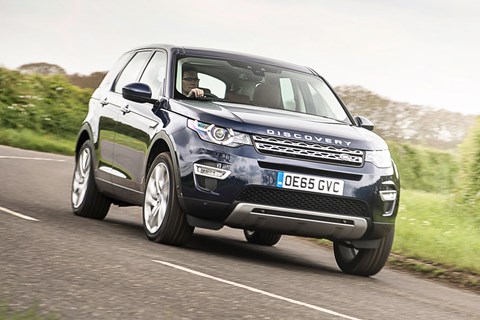
Land Rover has been fettling the Discovery since its launch, with JLR’s 2.0-litre Ingenium diesel replacing the original Ford unit, for example. We’ve run two examples of the engine: it was ‘disappointingly coarse and vocal’ in Ben Whitworth’s Jag XE, but noticeably less garrulous in the Disco Sport. With 317lb ft of torque to surf, there’s sufficient grunt to haul the Land Rover up to 62mph in 8.4sec. That’s a little slower than its lighter German rivals. But it doesn’t suffer from the laggy throttle response that afflicted our 2012 Evoque.
While the Jag XE had a silky smooth eight-speed ’box, transverse Ingenium engines have a different nine-speed unit. The theory is that more ratios give the engine more bandwidth to operate at economical speeds; the problem is that the transmission doesn’t half rattle through the cogs, and shifts can be quite obtrusive, especially when the oil is cold. Some team members preferred to take charge using the plastic shifters.
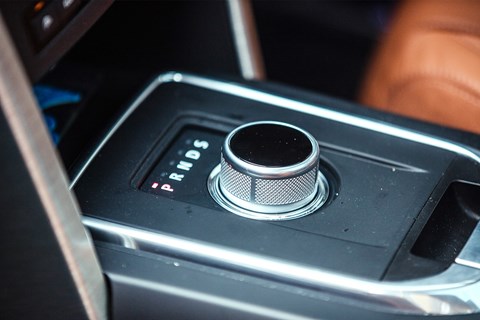
The Disco’s heft ensured we did not set any hypermiling records. Over 12 months, it averaged 33.8mpg, a miserable 36% off the official combined figure (though our S-Max and Passat turbodiesels have been similarly missing their marks). I did go easy on the throttle in August, trying to obey the on-board ecotraining programme (hardly Super Mario Run but addictive all the same), ekeing out a personal best of 36.3mpg.
Some elements of the cabin feel off the pace: the tiny touchscreen with a response time slower than a teenager getting out of bed, and the antiquated graphics (both since updated). The seats are firm but comfy and stylish, though having to plough through a sub-menu to turn on the heaters still grates. Software niggles froze the touchscreen on occasion, playing iPhone music by Firewire connection was temperamental, and the air-con fan bizarrely packed up for an hour. Upkeep was not cheap: the 21,000-mile service cost £358 and replacing a nailed 245/45 R20 Continental SportContact tyre £238, both before VAT.
Our Disco Sport didn’t have the star quality of our Evoque, or waft like the Range Rover that followed it. But we will always have that family holiday in France, and two Christmas expeditions, boot fully loaded, and the odd ride for seven. Versatility and spaciousness are rather loveable traits, it turns out.
By Phil McNamara
Logbook: Land Rover Discovery Sport HSE Luxury auto
Engine 1999cc 16v 4-cyl turbodiesel, 178bhp @ 4000rpm, 317lb ft @ 1750rpm
Gearbox 9-speed auto, four-wheel drive
Stats 8.4sec 0-62mph, 117mph, 139g/km CO2
Price £43,400
As tested £46,615
Miles this month 2124
Total 26,862
Our mpg 33.8
Official mpg 53.3
Fuel costs £341.87
Extra costs £0
Count the cost
Cost new £46,615 (including £3215 of options)
Dealer sale price £37,199
Private sale price: £35,804
Part-exchange price: £33,884
Cost per mile 12p
Cost per mile including depreciation £1.38
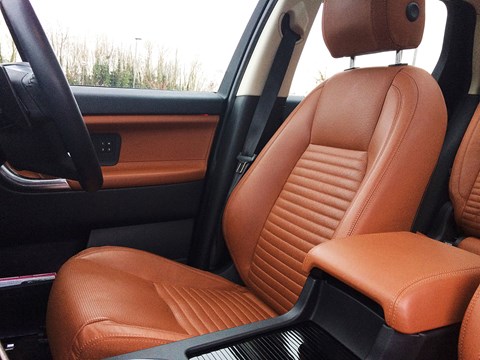
Month 11 running a Land Rover Discovery Sport: the crossover driving position
The crossover: I saw a Google chap deride carmakers’ websites for baffling punters with this nebulous term and pictures of identikit hatches.
No such confusion with the Discovery Sport: its two-box form, off-road capability and elevated ride height define it as SUV. Clamber in for a brilliantly practical driving position: seeing over traffic and all around really aids progress.
The HSE Lux’s stylish seat, firm but incredibly comfy, is spot on. There is a downside: body roll from the higher centre of gravity.
By Phil McNamara
Logbook: Land Rover Discovery Sport HSE Luxury auto
Engine 1999cc 16v 4-cyl turbodiesel, 178bhp @ 4000rpm, 317lb ft @ 1750rpm
Gearbox 9-speed auto, four-wheel drive
Stats 8.4sec 0-62mph, 117mph, 139g/km CO2
Price £43,400
As tested £46,615
Miles this month 2152
Total 24,738
Our mpg 33.9
Official mpg 53.3
Fuel costs £361.00
Extra costs £0
Month 10 runinng a Disco Sport: it's all about the details
That we can compare a Land Rover with a new Skoda says much about the SUV hierarchy in 2017. Time to take stock.
Join us on a whistle-stop tour of our Discovery Sport.
Seriously good to drive
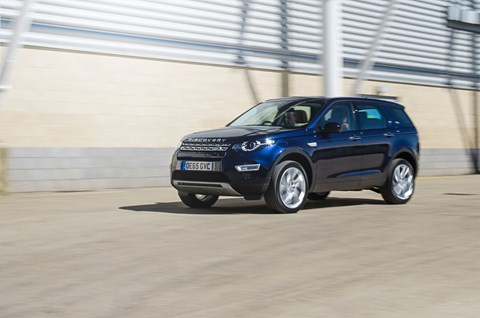
Peugeot, Skoda, Seat: 2017 welcomes the laggard SUVs, and driving the Disco’s rivals highlights its abilities. The Sport’s steering is excellent – sweetly weighted, responsive, measured – the diesel engine competitive on punch, if a little coarse. A note on the Loire blue paint (£625): its metallic flake sparkles in the sun – wish we’d paid £520 for a two-tone roof though.
Seriously awful infotainment
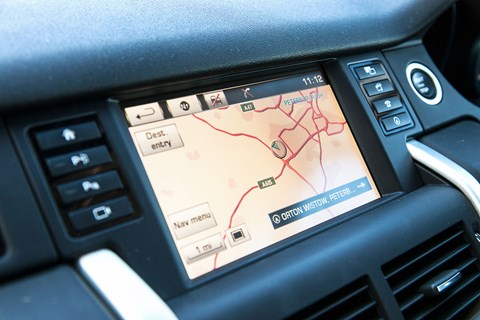
The Sport’s teeny screen, glacial response time, clueless traffic intel and the binnacle’s ZX Spectrum-style graphics were off the pace at launch; newcomers like the 3008’s i-Cockpit and the Kodiaq’s capacitive touchscreens make it feel antiquated. Design chief Gerry McGovern says the big Disco’s customers want a more premium feel – same for its junior version, please!
Welcome to row two
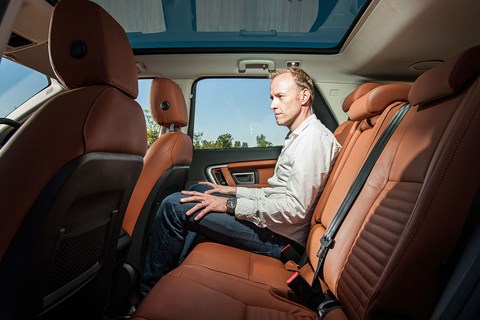
The Disco Sport’s magic trick is to squeeze seven seats into a package that’s 200mm shorter than Ford’s bloated Edge, yet still lavishes space on second row occupants. Lovely glass roof standard on level three trim HSE; our HSE Lux spec includes heated outer seats and two USB ports. Windsor leather – with its washboard stomach insert – far nicer than Skoda’s take on cow.
Welcome to the cheap seats
My mouth is open, but it’s not contorted in pain: I have spent short journeys as a backbencher. It’s the getting in that hurts: the Landie’s V-shaped aperture is narrow, tighter than the longer Kodiaq’s. Also, I can’t get my feet under the seats, but the bench in front slides 60:40, so you can negotiate for/demand extra legroom. We regularly use it as a seven-seater: genius versatility!
By Phil McNamara
Month 9 running a Land Rover Discovery Sport: Lots of practice! Why LR dealers are so good
Soothsayers predict life will get tougher for dealer groups, as electrification and over-the-air updates simplify servicing, and connectivity allows car makers to forge direct links with customers. But if 2016’s reliability surveys are a true gauge, a Land Rover franchise will survive longer than most, given the brand’s second bottom ranking with Warranty Direct and flat last with JD Power. Peterborough’s Marshall Land Rover is certainly rammed, putting our Discovery Sport in a Heathrow-esque holding pattern, with a two-week wait for its first service at 21,000 miles.
Attentive service advisor Sam Downes was well briefed that OE65 GVC would be high maintenance. Aside from the typical healthcheck and replacement oil and pollen filter, the Disco needed a new tyre pressure monitoring system sensor, after last month’s emergency where the aluminium valve broke and had to be replaced with a plain old rubber one. The 10 litres of AdBlue exhaust urea solution added a few months back had run dry; Marshall’s crew poured in 14, which should be good for another 6000 miles minimum of nitrogen oxide-suppressed running.
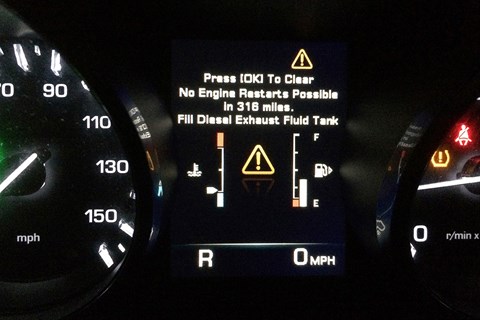
After the 9am handover, Marshall had a driver on hand to run me to work (in a wildly off-brand Peugeot 108), with Sam phoning back later with bad news: the rear left tyre, whose valve so nearly wrecked my family holiday, had been pierced by a nail. And while 20-inch rims may look nice, the requisite 245/45 Continental Cross Contact was not in stock, with the tyre arriving for fitting the following day costing a whopping £237.93 before VAT.
That was on top of the £358 charge for service parts and labour. Still, it gave Marshall the chance to make three fixes: the obligatory software update, a new clip to keep the rear number plate light attached, and a remedy for a rattling seat. Not that I’d noticed, due to the stiff springs causing child seat cacophony over undulations. All in all, my experience was courteous and efficient, with the Discovery Sport left sparkling inside and out. If Marshall keeps that up, it’ll be in business for a while yet – ably assisted by Land Rover’s gremlins.
From the driving seat
+ Precise, beautifully weighted steering
+ Punchy diesel is reasonably refined
+ Seats three to seven packaged brilliantly, with superb space in row two
– Suspension stiff on straights, plenty of body roll in corners
– Infotainment from the dark ages
Logbook: Land Rover Discovery Sport HSE Luxury
Price £43,400
As tested £46,615
Miles this month 2703
Total miles 21,502
Our mpg 34.2
Official mpg 53.3
Fuel this month £434.93
Extra costs £595.93 ex-VAT (service, new tyre)
By Phil McNamara
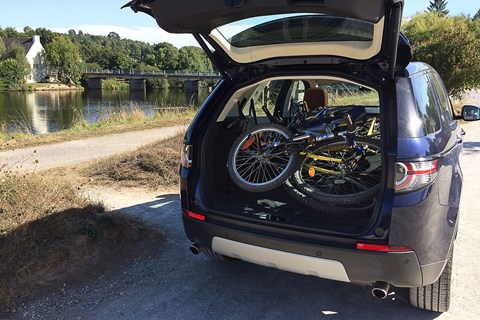
Month 8 running a Land Rover Discovery Sport: back in Europe, deflation and all
In comedy, timing is everything. So how funny is this: at 18:07 on a Friday night, just 10 dark hours before a 04:30 departure to catch a ferry for the family holiday, a tyre valve snaps off and the rubber deflates like a home-baked cake, right before my very eyes.
The AA’s Ian Jackson rode to the rescue within 70 minutes. No hope of a new tyre or a valve with tyre pressure monitoring sensor. But Ian got hold of Akbary Tyres in Stevenage, who would swap the brittle TPMS valve for a plain old rubber one. Ian, the wheel and yours truly completed the 44-mile round trip in his van, before the wheel was reattached three hours after the valve had first let me down. Phew!
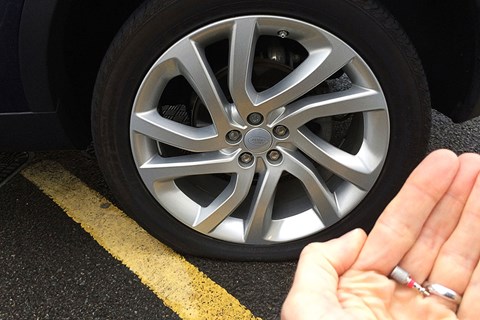
Frankly, I needed a hassle-free holiday to recover from that scare. And the Discovery Sport delivered (aside from the air-con blower downing tools briefly). It swallowed a suitcase, massive sports bag, three soft bags, a pram and a milliner’s entire summer stock beneath its tonneau cover. In Brittany, we also used it as a two-seat van to transport bikes (though it’ll take the forthcoming big Disco to transport bikes and kids). And I was packed into a rearmost seat for a brief ride back from dinner, with my in-laws upgraded to the posher perches. It was perfectly comfy (not because of my Bordeaux comfort blanket, bien sur).
Rewardingly, French roads brought out the best in the Sport. Tyre noise was much more muted on the autoroute (though the peace accentuated the diesel’s cruising drone), and the stiff-legged suspension’s hatred of sharp topographic changes wasn’t an issue on smooth French roads.
And the Sport’s trump card – its steering – shone on the narrow, winding, rural tracks. Charged by Exocet French vans, a nudge of the wheel and the Sport responds calmly, so you can precisely place it mere millimetres from the verge. A slow-in approach is vital in corners, otherwise you can induce a crocodile death spiral of body roll. But get your entry speed right, feel the grip, and you can string together bends with enjoyable fluency. Great fun. In eight days, we didn’t see another Disco Sport. Shame, because it’s a car that works splendidly in France.
Logbook: Land Rover Discovery Sport HSE Luxury Auto
Engine 1999cc 16v 4cyl turbodiesel, 178bhp @ 4000rpm, 317lb ft @ 1750rpm
Gearbox Nine-speed auto, all-wheel drive
Stats 8.4sec 0-62mph, 117mph, 139g/km CO2
Price £43,400
As tested £46,615
Miles this month 1963
Total miles 18,799
Our mpg 34.1
Official mpg 53.3
Fuel this month £291.11
Extra costs £95 (tyre valve)
By Phil McNamara
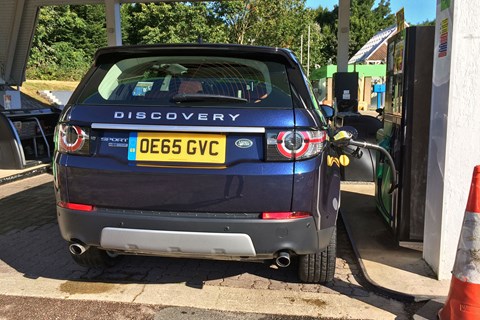
Month 7 running a Land Rover Discovery Sport: efficiency improvements
It’s treasonable not to be inspired by Britain’s olympians, so I’ve been training hard to smash the Disco Sport’s mpg PB. The car’s been averaging low 30s, but with a puritanical approach to the accelerator, and a nerveless attitude to the brakes (don’t!), I’ve seen 47.8mpg on the trip for a commute.
Sadly that becomes 36.3mpg over the whole month, but still much improved. It’s easier to drive efficiently with reduced traffic and no congestion: roll on those school breaks and quiet times.
Logbook: Land Rover Discovery Sport HSE Luxury Auto
Engine 1999cc 16v turbodiesel 4-cyl, 178bhp @ 4000rpm, 317lb ft @ 1750rpm
Transmission 9-speed auto, 4wd
Stats 8.4sec 0-62mph, 117mph, 139g/km
Price £43,400
As tested £46,615
Miles this month 1121
Total miles 16,836
Our mpg 34.9
Official mpg 53.3
Fuel this month £193.41
Extra costs £0
By Phil McNamara
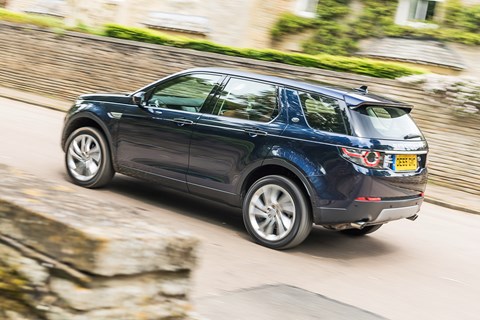
Month 6 running a Land Rover Discovery Sport: nice packaging, shame about the wrapping
Form or function? I’ve spoken to a few car designers who decry prioritising the, ahem, former as the devilish work of ‘stylists’. But without wishing to sound like a shallow aesthete, who doesn’t love a little wanton detailing? Over the years, my head has been turned by everything from BMW’s swan neck gear selector to the Range Rover graphic in its puddle lighting to the indulgent, Pixar-lite animations of VW’s new Tiguan in its TFT binnacle. Such wantonness is in short supply in the Discovery Sport.
But, my word, Land Rover has absolutely nailed the functionality. There simply isn’t another seven-seater offering the same combination of reasonably compact size, practicality and desirability. The McNamara family uses seats six and seven every month or two, where my pint-sized wife can sit beside one of my daughters in a child seat. But most of the time we trundle around in five-seat mode. The tiered second row has abundant legroom and decent all-round visibility, while the fudge-coloured interior, comfortable and supportive seats and panoramic sunroof make for a very welcoming environment.
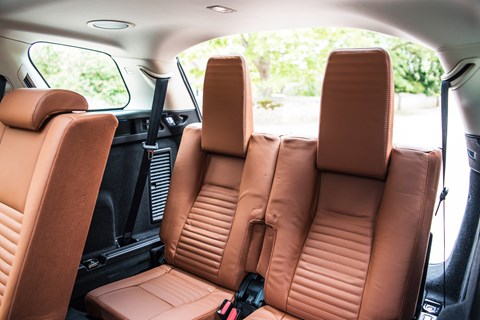
Apologies for getting drily practical here, but the load bay in five-seat mode is 689 litres deep: it can take my mum’s wheelchair at an angle atop my daughter’s baby buggy, with space for a few more sundries. Drop the second row of seats with a crank of the side-mounted handles, and you’ve got a near flat load bay that takes nearly 1700 litres of rubbish dump load – more than a Mondeo wagon or Volvo V70 – and the equivalent of a week’s leftover Amazon delivery boxes in my household.
If the practicality rocks my world, I’d like to throw rocks at the infotainment system. The sat-nav interface dates back to decade-old Jags I reckon, with its graphics basic and features limited compared with German rivals’. BMW’s Real Time Traffic Information repeatedly updates your nav map to show live congestion and recalculates your journey time with uncanny accuracy: my family sat in two hours of M25 congestion, while the Disco’s map blithely displayed that the road was clear. Knowledge gives you the power to seek another route.
Hook up an iPhone to access your music, and marvel at how long it takes to forward to a song: it would be quicker to cue up an LP. Indeed, the fast forward buttons intermittently went on strike for a week or so. But when you do get a song playing, the 17-speaker Meridian audio system relays it with a rich, undistorted sound. The £2590 entertainment pack also includes a TV tuner, which I’ve used to amuse my eldest in traffic or to watch the occasional England footie match, often giving thanks that the in-out signal protects me from the full horror of the national team.
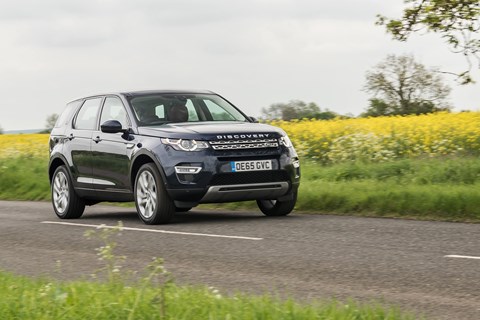
In other news, the binnacle has flashed up a message: ‘fill diesel exhaust fluid tank’. To meet the Euro 6 emissions standard, diesel cars typically inject urea into the exhaust flow: the resulting chemical reaction transforms harmful nitrogen oxides into nitrogen. The Disco Sport has a 13.7-litre urea tank, expected to last up to 6050 miles – we’ve managed to pass the 11,000-mile mark before refilling.
I picked up 10 litres of AdBlue (the urea solution’s trade name) at the local BP for £11.99. Replenishing the tank is just like filling the washer bottle, although the pressure of 10 litres coming down the spout produced plenty of splashes to clear up. Out went the warning light. But I’m getting very twitchy about another potential warning message – I’ve not added any oil yet. I’ll continue my routine of fortnightly dipstick checks, to be on the safe side...
Logbook: Land Rover Discovery Sport HSE Luxury Auto
Engine 1999cc turbodiesel 4-cyl, 178bhp @ 4000rpm, 317lb ft @ 1750rpm
Transmission 9-speed auto, four-wheel drive
Stats 8.4sec 0-62mph, 117mph, 139g/km
Price £43,400
As tested £46,615
Miles this month 715
Total miles 12,637
Our mpg 33.5
Official mpg 53.3
Fuel this month £108.86
Extra costs £11.99 (exhaust fluid)
By Phil McNamara
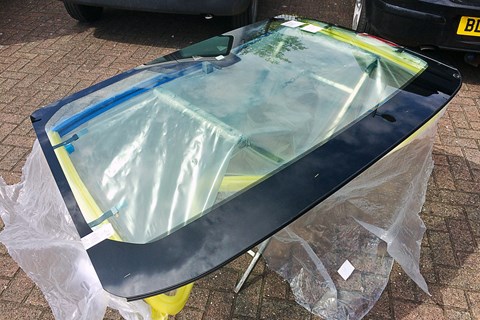
Month 5 running a Land Rover Discovery Sport: stone 1, windscreen 0
The Discovery Sport has almost as many windscreens as Heinz’s 57 varieties. Okay it has 11, catering for features such as quickclear filaments, head-up displays and road-scanning cameras. I know this because, after a stone chip turned into a huge crack, my Sport’s windscreen was in need of replacement.
After waiting 15 days for Autoglass to call back (I, ahem, cracked first) and having located the right screen, a week later it was fitted. Hooking two guide pegs into the frame mounts the glass accurately to give the camera clear sight, then connect the screen heater, a quick check of the auto-lamps light sensor, and, 90 minutes later, the Disco is no longer cracking up.
Logbook: Land Rover Discovery Sport HSE Luxury Auto
Engine 1999cc diesel 4-cyl, 178bhp @ 4000rpm, 317lb ft @ 1750rpm
Transmission 9-spd auto, 4wd
Stats 8.4sec 0-62mph, 117mph, 139g/km CO2
Price £43,400
As tested £46,615
Miles this month 1962
Total 11,922
Our mpg 33.4
Official mpg 53.3
Fuel £297.38
Extra costs £0
By Phil McNamara

Month 4 running a Land Rover Discovery Sport: everything but the Sport
Sport: why is that five letter-suffix attached, besides differentiation from the bigger Discovery? I guess most people want to project a dynamic image, even if in reality their cornering g forces are measured by theodolite, and their acceleration by calendar.
But the Sport does not, to be honest, live up to its billing. This is a satisfying family car, not a wannabe sports SUV. The primary ride is smoothly supple, the body rising and falling as naturally as your chest inhaling and exhaling.
That said, the body and suspension feel rigid – great for accurate handling – which can make for some choppiness over high-frequency bumps. Upgrading to the biggest, 20-inch alloys can’t have helped, which can occasionally skip and make the body pogo, with the child seats frequently rattling in their fixings.
When you propel the Disco into a corner, the body leans like Muhammad Ali onto the ropes. And like the greatest, it’s stable and in control, ready to dance around the obstacle. The steering is a fantastic accomplice: nicely geared and fluid. There’s plenty of grip, despite the body not being too tightly lashed down, so you can carry momentum into corners and close the gap to traffic ahead.
And you need to maintain impetus, because the steel-bodied, all-wheel-drive Discovery Sport is a heavy car: 1884kg in HSE Luxury spec. The latest Ingenium diesel musters a meaty 317lb ft at 1750revs, but accelerating from stop to 62mph still takes 8.4sec. The engine spins smoothly to its redline just past 4000, and it sounds considerably less raucous than in the Jaguar XE. Wind noise and tyre murmur at motorway speeds are acceptable too, making the Disco’s cabin a pretty calm environment.
Unlike the nine-speed automatic transmission, which is decidedly hyperactive. It races to third gear before you hit 10mph, although the flipside is an occasional hesitancy to change down. And the shifts can be pretty lumpy, making the cabin shudder like a Lamborghini blasting through the cogs in track mode.

One night early on, a gearbox fault warning light came on, and I had to join the A1 with just a single cog (thankfully third), before bailing out after a junction, tacho pinned against the red ceiling. A quick engine restart and the problem was resolved.
Other electronics gremlins include the infotainment freezing a couple of times, and a rogue engine ‘emissions issue’ that disappeared overnight (VW would love to follow suit). But there’s a physical problem that now needs resolving: a lorry-propelled stone grenade cracked the windscreen faster than you could say San Andreas fault. Time for a call to Autoglass...
From the driving seat
+ Precise, middleweight steering stands out
– Comfy ride, but not at the expense of dynamism
– Busy 9-speed ‘box arguably has three cogs too many
+ Torquey, refined diesel
+ Dashboard lacks flair
Logbook: Land Rover Discovery Sport HSE Luxury Auto
Engine 1999cc turbodiesel 4-cyl, 178bhp @ 4000rpm, 317lb ft @ 1750rpm
Transmission 9-speed auto, four-wheel drive
Stats 8.4sec 0-62mph, 117mph, 139g/km
Price £43,400
As tested £46,615
Miles this month 1344
Total miles 9960
Our mpg 33.5
Official mpg 53.3
Fuel this month £189.21
Extra costs £0
By Phil McNamara
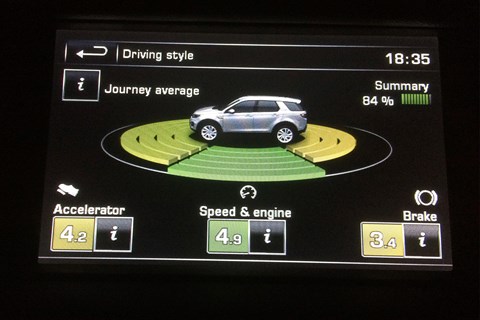
Month 3 running a Land Rover Discovery Sport: fuel consumption woes
The Disco Sport comes with Craig Revel Horwood as standard, aka a graphical driving coach which rates your eco credentials as brutally as the Strictly Come Dancing judge.
Stepping on the throttle as gingerly as a radioactive puddle, never exceeding the limit and braking for hazards half-a-mile away, I managed peak fuel economy of 38.4mpg. Still 28% off the official figure! And after lapsing into less saintly progress, the month’s average was 33.3 – only 0.1mpg better than CAR’s 2012 Evoque, with its Ford-sourced lump. Poor show.
By Phil McNamara
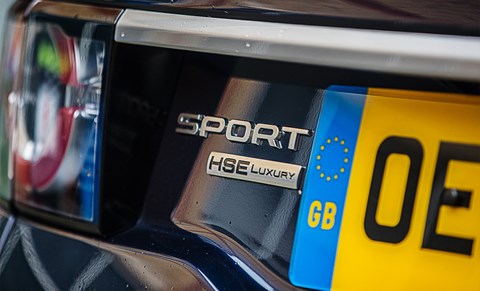
Month 2 running a Land Rover Discovery Sport: how usable is the final row of seats?
I’ve got a thing for Plus Twos. Not the misshapen golfing trousers, the additional row of seats in the Disco Sport. We’re only a family of four, but we use its seven-seat capability every few weeks, whenever we’ve got extended family to herd.
Getting into the rear isn’t easy: even with the second row slid fully forward, the V-shaped aperture is only for the snake-hipped. But my 5ft wife and eldest daughter, in bulky child seat, can happily handle 20min journeys with the incentive of pub or softplay at the end. In an SUV this compact, it’s genius packaging.
By Phil McNamara
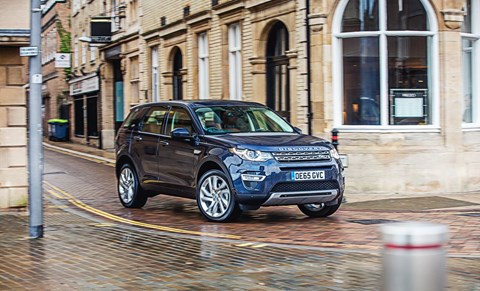
Month 1 running a Land Rover Discovery Sport: the introduction to our long-term test
Things that get taken for granted: water, wi-fi connectivity, wives, democracy, the family car. Indeed, you know you’ve got the ideal car when it slips into the background of your life, effortlessly carting the family and their myriad possessions, performing reliably, devoid of niggles and not supping too much fuel, while still being thoroughly satisfying to drive. Can Land Rover’s Discovery Sport fulfil that brief over the next 12 months?
Despite resembling a shrunken Range Rover Sport, the Discovery Sport doesn’t ooze status and performance but deeply unpretentious practicality. This is a seven-seat SUV, or 5+2 in Land Rover-speak, in a bid to make the rear seats as forbidding to grown-ups as a Donald Trump presidency.
The packaging is witchcraft: seven perches in an SUV barely a marker pen-longer than the deposed Freelander 2. Only the more elongated Hyundai Santa Fe and Nissan X-Trail offer the same versatility in the midsize SUV segment: otherwise you must trade up to the vast Q7 or XC90, or venture into MPV territory. But the latter forsake the Disco Sport’s raised ride height and dominant world view, and its related off-road capability.
The drivetrain choice is surprisingly uncomplicated for UK buyers. There’s just one 2.0-litre ‘Ingenium’ diesel engine, with either 148bhp/276lb ft or 178bhp/317lb ft. Unlike in the Evoque, there’s currently no front-wheel-drive option: choose from six-speed manual or nine-speed automatic transmission to channel power to all four wheels. We’ve opted for the higher output engine (naturally) and stumped up £1805 for the auto: its different ratios bite a whole second from the manual’s 9.4sec 0-62mph time.
The Discovery Sport came to market with a 2.2-litre Ford diesel, but the JLR-developed and built Ingenium unit replaced it last summer. It’s smooth, even when you wind it out to the redline, and combustion clatter is well suppressed. The same four-pot powers our long-term Jaguar XE too, where it makes a bellowing noise twinned with Pavarotti’s vacuum cleaner, accompanied by an induction whistle reminiscent of a badly tuned radio. Surely some mistake: an SUV engine sounding more refined than a Jag’s!
Carbon emissions are 139g/km, with a combined fuel consumption figure of 53.3mpg (both figures lag way behind the Jaguar’s, as you’d expect given the Land Rover is 319kg heavier). But in our first full month at the wheel, mostly during fast motorway commutes, the Disco averaged 33.3mpg – that’s a shocking 37% off the official figure. Seriously need that economy to improve over time.
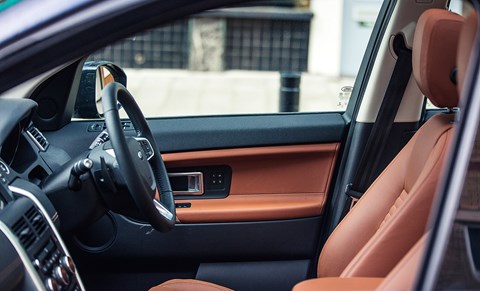
The entry-level 150PS manual SE costs £31,095, and the essentials are standard: climate control, DAB, Bluetooth, 18in rims, heated part-leather front seats, rear parking sensors. We graduated through two more trim levels: SE Tech which adds nav, front parking sensors and automates wipers, headlamps and tailgate (add £1500), and HSE (invest another £3700) whose highlights include powered leather seats, glass roof panel, keyless entry and Xenons with auto high beam.
Our trim level is £43,400 HSE Luxury, or National Trust spec as christened by features ed Ben Miller. You can create a more expensive Discovery Sport with black gloss grille and mirror caps (HSE Black), or the same gothic details combined with a sports bodykit (HSE Dynamic Lux) but both seem a little showy and go against our Land Rover ideal. We selected muted blue metallic (£625) and eschewed the Evoque-style contrasting roof for £520.
HSE Lux wraps the powered/heated/cooled seats in cow (in a suitable rich fudge colour), and adds posterior warming and USB ports for the second row too. Trump seat occupants also get a USB socket to fight over and dedicated climate control too. The final features are illuminated treadplates and configurable mood lighting, plus automated parking modes which can be deployed if hands need a break from the heated steering wheel.
Given the luxurious equipment levels, the only option ticked was the £2590 entertainment pack, which includes upgraded, 17-speaker Meridian Audio system, TV tuner and hard disk navigation. Total price? £46,615.
First impressions? The primary ride is silky and loping, but when the surface gets choppy, occupants certainly feel it. The body is nicely controlled, with measured roll in corners. And the steering, though about as chatty as Kimi Räikkönen, is consistent, composed and encourages you to make the most of the plentiful front-end grip. Dynamically, I’m already taking the Disco for granted; time will tell if that applies to the rest of the package too.
Disco spec highlights
- National trust spec: £625 Loire blue metallic for understated exterior; leather inspired by Werther’s Originals very appropriate
- Wishbone wheels: Upgrading to handsome, irregularly spaced 20s free on HSE Lux
- Stone age screen: Disco is last JLR car hobbled by slow, graphically challenged touchscreen
- The cost of no cost: 17-speaker Meridian audio is gratis on HSE Lux – so long as you spec £2590 entertainment pack!
Logbook: Discovery Sport HSE luxury auto
Engine: 1999cc turbodiesel 4-cyl, 178bhp @ 4000rpm, 317lb ft @ 1750rpm
Transmission: 9-speed auto, 4wd
Stats: 8.4sec 0-62mph, 117mph, 139g/km
Price: £43,400
As tested: £46,615
Official mpg: 53.3
Read more of CAR magazine’s long-term tests